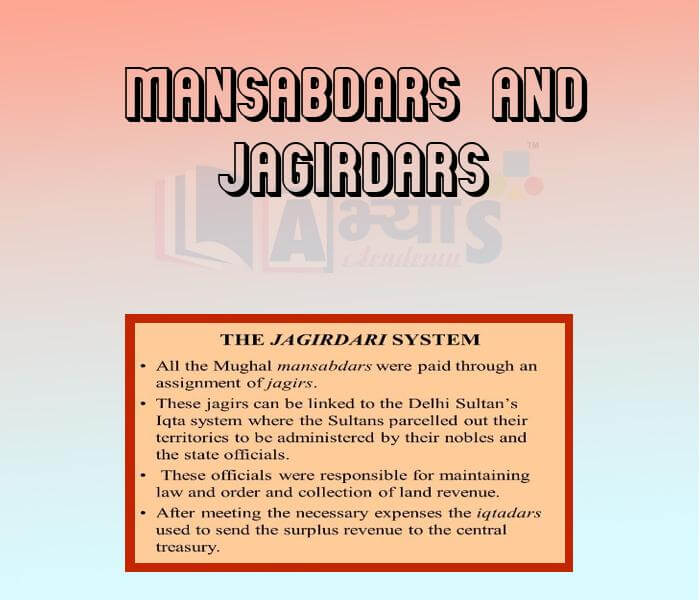Mansabdars and Jagirdars









Mansabdars and Jagirdars
Mansabdars and Jagirdars: As the empire expanded to encompass different regions the mughals recruited diverse bodies of people. From a small nucleus of Turkish nobles they expanded to include Iranians, Indian Muslims, and Afghans, rajputs, Marathas and other groups. Those who joined mughal service were enrolled as mansabdars. The term mansabdar refers to an individual who holds a mansab, meaning a position or rank. It was a grading system used by the mughals to fix
(1) rank,
(2) salary and
(3) military responsibilities.
Rank and salary were determined by a numerical value called zat. The higher the zat, the more prestigious was the noble’s position in court and the larger his salary. The mansabdar’s military responsibilities required him to maintain a specified number of sawar or cavalrymen. The mansabdar brought his cavalrymen for review, got they registered, and their horses branded and then received money to pay them as salary. Mansabdars received their salaries as revenue assignments called jagirs which were somewhat like iqtas.

But unlike Muqtis, most mansabdars did not actually reside in or administer their jagirs . They only had rights to the revenue of their assignments which was collected for them by their servants while the mansabdars themselves served in some other part of the country.
In Akbar 's reign these jagirs were carefully assessed so that their revenues were roughly equal to the salary of the mansabdars. By Aurangzeb's reign this was no longer the case and the actual revenue collected was often less than the granted sum. There was a huge increase in the number of mansabdars , which meant a long wait before they received a jagir. These and other factors created a shortage in the number of jagris .As a result , many Jagirdars tried to extract as much revenue as possible while they had a jagir.Aurangzeb was unable to control these developments in the last years of his reign and the peasantry therefore suffered tremendously.
Students / Parents Reviews [10]
It has a great methodology. Students here can get analysis to their test quickly.We can learn easily through PPTs and the testing methods are good. We know that where we have to practice

Barkha Arora
10thI have spent a wonderful time in Abhyas academy. It has made my reasoning more apt, English more stronger and Maths an interesting subject for me. It has given me a habbit of self studying

Yatharthi Sharma
10thA marvelous experience with Abhyas. I am glad to share that my ward has achieved more than enough at the Ambala ABHYAS centre. Years have passed on and more and more he has gained. May the centre flourish and develop day by day by the grace of God.

Archit Segal
7thIt was a good experience with Abhyas Academy. I even faced problems in starting but slowly and steadily overcomed. Especially reasoning classes helped me a lot.

Cheshta
10thBeing a parent, I saw my daughter improvement in her studies by seeing a good result in all day to day compititive exam TMO, NSO, IEO etc and as well as studies. I have got a fruitful result from my daughter.

Prisha Gupta
8thMy experience with Abhyas academy is very good. I did not think that my every subject coming here will be so strong. The main thing is that the online tests had made me learn here more things.

Hiya Gupta
8thIt was good as the experience because as we had come here we had been improved in a such envirnment created here.Extra is taught which is beneficial for future.

Eshan Arora
8thAbout Abhyas metholodology the teachers are very nice and hardworking toward students.The Centre Head Mrs Anu Sethi is also a brilliant teacher.Abhyas has taught me how to overcome problems and has always taken my doubts and suppoeted me.

Shreya Shrivastava
8thAbhyas Methodology is very good. It is based on according to student and each child manages accordingly to its properly. Methodology has improved the abilities of students to shine them in future.

Manish Kumar
10thMy experience was very good with Abhyas academy. I am studying here from 6th class and I am satisfied by its results in my life. I improved a lot here ahead of school syllabus.
